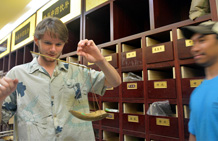
GAVI Alliance bridges China-Africa immunization cooperation
Source: Xinhua
Updated: 2015-09-24
BEIJING, Aug. 17 (Xinhua) -- GAVI Alliance, formerly the "Global Alliance for Vaccines and Immunization", held an event to share the Chinese experience of immunization to African health ministers at the China-Africa health forum on August 17,2013.
The round-table discussion, in partnership with the China's National Health and Family Planning Commission (NHFPC), focused on the lessons that can be learnt from China's hepatitis B (Hep B) vaccination program.
"The most important thing in terms of lessons that we can learn from China is the value of political interest in advocacy, implementation, and monitoring (of the vaccination program)," siad Dr. Mercy Ahun, special representative for Gavi Eligible Countries.
In her opinion, political commitment is the bedrock of China's success in the program.
Since the GAVI-China Hep B project began in 2002, the percentage of newborn children immunized at birth has climbed from 64 percent to over 90 percent. Now, less than 1 percent of children under 5 are chronic carriers of Hep B.
The project, which ended in 2010, was initially 50 percent co-funded by the Chinese government. China then introduced the Hep B vaccine into its routine immunization program in 2005.
Dr. Ahun said African countries can learn from China how to improve national ownership of programs. Then, after international partnerships pull out funds, they can rely on themselves.
Chinese experts share her view. Dr. Cui Fuqiang, the country manager of the GAVI-China Hep B project, mentioned other reasons for the success of the program, including increasing hospital delivery rates as a precondition of immunizing newborns against Hep B; and two domestic Hep B vaccine production lines lowering the price drastically.
Dozens of health officials from African countries attended the round-table discussion, and expressed their hopes.
Kondi Charles AGBA, the health minister of Togo, said "We hope China can help us manufacture vaccines. Only by being able to produce vaccines ourselves, can we lower the cost of immunization." Right now, the country's vaccines are donated by GAVI.
Dr. Ahun said, Gavi alliance has worked extensively with various African countries and China, and the organization will inject its experiences of working with both sides to the China Africa health cooperation.
Zhang Yang, an official with the NHFPC, said having GAVI purchase vaccines from China and provide to African countries would be a future direction of cooperation.
"China being one of the GAVI's first once-eligible countries turning into a GAVI donor has such significance for the organization's development, as well as China's unique position in development aid and its role in Afria," the GAVI news release read.
"We want to learn from China's experiences, because China has something to show, and something the rest of the world can learn from," said Dr. Hon. Ruhakana Rugunda, health minister of the Republic of Uganda, "China now has a heavy responsibility".

World Family Summit
The World Family Organization was founded in Europe in 1947 and headquartered in Paris.
Link: China's Central Government / World Health Organization / United Nations Population Fund / UNICEF in China
Copyright 2014 National Health and Family Planning Commission of the PRC All rights reserved






